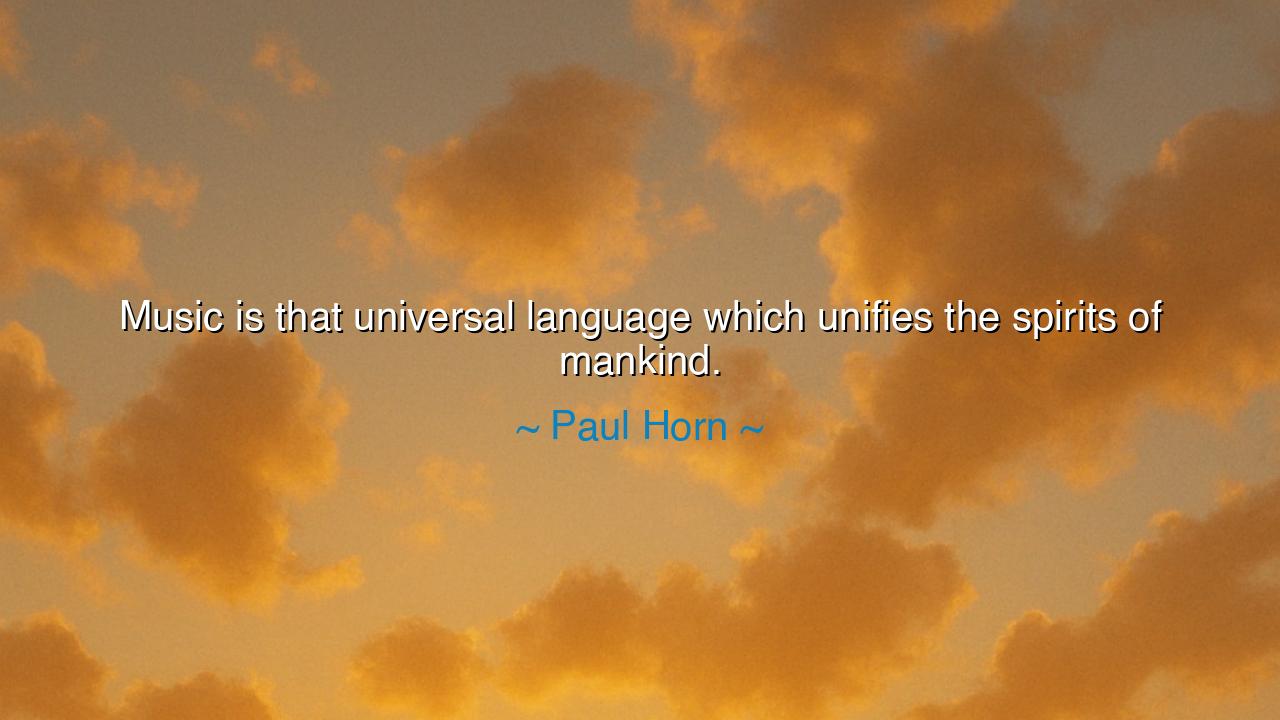
Music is that universal language which unifies the spirits of






The words of Paul Horn—“Music is that universal language which unifies the spirits of mankind.”—resound like a truth spoken from the depths of eternity. In them lies the acknowledgment that though men are divided by borders, tongues, and customs, there exists a single voice that all can understand. That voice is music, which needs no translation, for its meaning is carried not by words but by vibration, by rhythm, by the stirring of the heart. Where speech falters and fails, melody rises and makes strangers into brothers.
Horn, a musician who journeyed far beyond the confines of the Western stage, embodied this truth in his life. He carried his flute into sacred places, even into the Taj Mahal, where he recorded sounds that echoed like prayers through marble halls. For him, music was more than performance; it was communion, an offering that reached beyond creed or culture, uniting the spirits of all who listened. His words remind us that to speak the language of music is to speak directly to the soul, bypassing every wall erected by men.
The ancients knew this well. In the courts of kings and in the temples of gods, music was present as the unifier of men and divinities alike. The Greeks believed that the harmony of the lyre reflected the harmony of the cosmos, and the Hebrews lifted psalms that were understood by the soul even if not by the tongue. In the East, the drone of the sitar, the beat of the drum, and the chant of monks brought together entire peoples in moments of shared transcendence. Across the earth, music has forever been the common tongue of the heart.
History shows us how this language has healed and united. During the Christmas truce of World War I, soldiers entrenched in bitter conflict laid down their weapons when they heard the familiar strains of “Silent Night.” Enemies who could not speak each other’s words found unity in a carol, their spirits touched by the same melody. For a few sacred hours, they were no longer Germans and Britons, but men—united by music. This moment reveals Horn’s wisdom: what politics divides, music can bind.
The meaning of his words is that music carries within it the essence of human connection. It awakens emotions that are not bound by culture: joy, sorrow, hope, longing, peace. When a mother sings a lullaby, her child is soothed whether in Africa, Asia, or Europe. When a people grieve, their dirges sound alike in every land. This is because music speaks to the shared fabric of our humanity, the spirit within that longs for beauty, for meaning, for unity.
The lesson for us is powerful: if we would overcome division, we must remember the language that unites us. Do not think of music only as entertainment, but as a force capable of dissolving barriers. Let it be used to heal wounds, to bring enemies together, to remind us of what we share rather than what divides us. For in every note lies the potential for unity, and in every song lies the chance to awaken what is most noble in man.
Practically, this means seeking out opportunities where music can build bridges. Share songs with those of different backgrounds. Listen to the music of other cultures, and let it expand your heart. Use music to comfort the grieving, to strengthen the weak, to celebrate the joyful. In your home, let music be a thread that binds family together; in your community, let it be the voice that calls all to unity.
Thus Paul Horn’s words stand as a timeless command: “Music is that universal language which unifies the spirits of mankind.” Cherish this truth, and live by it. For when you embrace the power of music not as a pastime but as a sacred gift, you will find yourself not merely a listener, but a participant in the great symphony of humanity. And in that symphony, all hearts, however different, beat as one.






AAdministratorAdministrator
Welcome, honored guests. Please leave a comment, we will respond soon